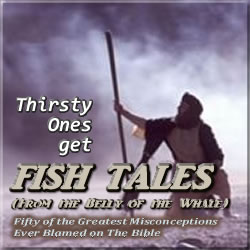To Donate or Not to Donate
That is the Question, Pt. 1 of 5
So, you’ve visited The Lost Stories Channel, and you’ve made your way through various articles, previews, audios, videos, and books. In the process, you’ve learned a thing or two along the way. And if you have learned some things, you’d probably agree the message here, while biblically-based, doesn’t convey your typical mainstream version of The Bible. Still, because it does convey a genuine Christian message, you’ve wondered how you might support The Lost Stories Channel and its mission.
In line with that, you’ve even expected to see a “Donate” Button somewhere on this site and wondered why there are none to be found. It’s because, as dedicated as we are to bringing you a staunchly biblical message, we have to confess we don’t take donations here because the word “donate” never once appears in Scripture. Don’t believe me? Prove me wrong, then. Get out your Strong’s Concordance of The Bible and look for it; but trust me, you can’t find it. Notice that when you get to the word “dominion” the next word that appears is “done.” But unbelievable as it may be, never once does the word “donate” appear. How crazy is that? All these years we keep hearing churches asking us for donations to support them and all the good things they do for humanity in the name of God.
But wait, you may ask, if that’s the case, then why do websites (let alone every church in the history of churches), professing to teach The Bible, ask for donations? I mean, aren’t organizations that provide gathering places for the saints, that feed the poor, and care for widows and orphans worthy of our financial support? Naturally I’m not saying that the saints, the poor, the widows, and the orphans don’t deserve being cared for. What I am saying, though, is that there is a huge difference between biblically-aligned giving and what tradition has been insisting is God-inspired giving.
And the first step toward a truly biblical understanding of giving is to acknowledge: Biblical “giving” should never be confused with the so-called act of “donating.”
What we’re dealing with, then, is just one more of those great misconceptions that I describe in my book Fish Tales (From the Belly of the Whale): Fifty of the Greatest Misconceptions Ever Blamed on The Bible. What we’re dealing with is the fact that giving is so central to God’s purposes for humanity that it is inevitably one of the most important targets of the enemies of truth. What we’re dealing with, as with every other great truth in Scripture, is a perniciously unhealthy dose of the devil’s disinformation that seeks to cloud and distort a correct understanding of how God’s gift ministers should be talking about money.
Story Continues Below
Says Richard Price—the founder and CEO of Academia.edu—on his podcast In Depth With Academia:
Fish Tales (From the Belly of the Whale): Fifty of the Greatest Misconceptions Ever Blamed on The Bible is:
To hear Price’s book review of Fish Tales (From the Belly of the Whale), CLICK HERE.
To hear Kent and Zen Garcia talk about correcting biblical misconceptions, from June 23rd, 2021, CLICK BELOW.
Story Continues From Above
A major form of confusion arises when abuses are revealed in connection with church ministries that have allegedly misused funds “entrusted” to the church by its members, whether in the form of outright misappropriation of monies that are used differently from those outlined when they were received or when church leaders succumb to the temptation of enriching themselves at the expense of their parishioners. Yet as bad as such situations are to the hurt of the church’s reputation, the real tragedy is, such scandals, rather than inspire reform, typically inspire the exact opposite. Critics interpret such events so as to confirm their already cynical view of church leaders and their self-indulgent shenanigans, while at the same time church leaders commit even further to what they see as their God-given right to receive said “donations.”
Never mind that such criticism from unbelievers is often perfectly justified—in principle, at least, though not necessarily in fact, which we’ll demonstrate in just a bit. That said, rather than wasting time arguing with cynics who insist such outcomes are inevitable and church leaders who insist they’re somehow beyond heavenly reproach, I’d suggest a completely different way to examine the issue, one which seeks to shed light on the true nature and purpose of giving as God has clearly proscribed for us in The Bible. The goal of such an approach will be two-fold: First, it will take the dagger out of the hand of cynics who insist that they alone are able to protect the innocent from corrupt religious leaders, and second, it will eliminate the confusion about why God Himself doesn’t seem to punish religious leaders who abuse their financial responsibilties.
For example, recall a scene in The New Testament, where Jesus famously commended the widow who gave her two “mites,” as Scripture calls them. What most people fail to notice is that—keeping in mind our previous scenario describing financial shenanigans—something clearly should have happened here, but it didn’t. Envision the scene as it unfolded as Jesus watched the widow give, as He Himself recounted, “all the money she had left in the world.”1 Then remember everything we know about the conflict between Jesus and the Jewish religious leaders to whom this gracious lady was about to give. From a purely human perspective, what should we have expected to see? Naturally, we’d all have expected that Jesus would’ve warned the widow to avoid contributing to a temple treasury from which twenty pieces of silver would one day tempt Judas to betray Him. So why didn’t He? In a nutshell, it’s because God’s ways are not man’s ways. What do I mean by that? Well, let’s see.
This brings us, then, to the most important thing we should remember about biblically-based giving: Giving isn’t something you do just so others can benefit from it. Of course others can and do benefit because of your giving to a religious cause or community. However, never is your giving intended to simply be something that others are supposed to “cash in on,” as it were. In short, the true purpose of giving is that it is an act of worship—pure and simple—something that is focused wholly on God’s command that we give in response to the gift of His word, without which we’re lost in a world of darkness and confusion.
As such, Jesus knew that God would honor the widow’s act of giving no matter what the people who received that gift did with the money she gave. In this we’d do well to remember the context of biblical giving, which is described, more often than not, as a burnt offering. True giving, in that context, then, is when we give something that is a benefit to no one but the one who offered it up to God, because that gift is burned in the act of giving and so it literally goes up in smoke.
That said, several things spring to mind, because naturally, when we talk about biblical giving, and we look to this act as it’s recorded throughout Scripture, we have to admit there is a great deal of ambiguity involving giving, historically. One moment, Jesus is unconcerned about the widow giving to a corrupt treasury, but the next moment, He’s famously whipping the money changers and overturning their tables of merchandise. So which is it? Is Jesus wishy-washy about His views on giving? Or is The Bible confused, with just one more example of it apparently contradicting itself?
It’s exactly this kind of ambiguity that inspires me to write books like Fish Tales (From the Belly of the Whale) in the first place, because unless you fully embrace the paradoxical nature of biblical truth, you will forever fall victim to critics and skeptics who insist Scripture can’t be trusted. But once you do reconcile the paradox of truth, you’re well on your way to approaching to the true nature of such things even as confusing as this issue of biblically-inspired giving to God versus humanly-inspired donating to a worthy cause.
The next thing we need to understand comes from unravelling yet another misconception of The Bible. This time we turn to Paul’s letter to the Galatians, where we encounter a reference well known not only to believers but unbelievers as well. There we read Paul’s famous statement that “God is not mocked, for whatsoever a person sows, that is what they will reap.”2 However, as I point out in Fish Tales (From the Belly of the Whale), this verse is completely misinterpreted due to several factors. One reason is it’s always quoted out context, and the other reason is due to the confusing way one the most important words in this verse is translated. Let me explain what I mean.
In this case, I’d like to insert an entire chapter from Fish Tales that deals with this idea that whenever we hear the statement “you reap what you sow,” we can’t help but think it means that good things will happen to those who do good and bad things will happen to those who do bad. What’s more, in reexamining this idea of reaping and sowing we’ll not only demonstrate how this famous Galatians passage is constantly being misapplied, but we’ll also discover a brand-new way of looking at another famous saying that at first glance doesn’t even seem related to it but soon will relate to it after we readjust the big picture, as follows:






